Meet the people behind our centre, discover their areas of expertise, interests, and recommendations.
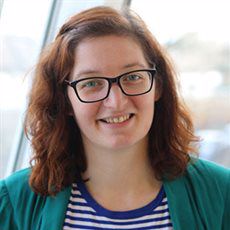
Dr Amy Burge is a lecturer in Popular Fiction at the University of Birmingham and is the co-director of the CCLC. Her teaching and research interests are in popular fiction, in particular romance, both medieval and modern. Her work is intersectional and focuses on gender, ethnicity and sexuality. She is currently leading an AHRC-funded networking project on Muslim women’s popular and genre fiction.
Could you tell us a bit about your current research…
My research is in popular and genre fiction, specifically popular romance, and I’ve got lots of interests around popular romance fiction. I’m particularly interested in how the genre represents ideas around identity, specifically race, religion, nationality and gender. I look at those questions about intersectionality and identity in popular romance, which is one of the biggest contemporary genres and also, at the same time, one of the oldest genres. It’s both contemporary and very historical at the same time.
I’m doing a little bit of work at the moment on representations of Scottishness and Scotland in popular romance fiction in the 20th century and into the 21st. This is partly thinking about the success of Diana Gabaldon’s Outlander in the 1990s, but what I want to argue is that there’s a longer tradition of writing about Scotland and Scottishness in romance fiction that doesn’t always get the credit that it deserves. The other project that I’m picking up a bit more is about how contemporary genre fiction deals with themes of migration and refugeedom. I’m particularly interested in what popular romance texts have to say about how migration effects intimacy and intimate relationships, which is a topic of interest to social scientists, but it’s been less explored in relation to literature and, in particular, genre and popular literature.
How are things on the ground for you and how has the pandemic changed how you are working?
It’s changed quite a lot. Day-to-day I work in a very different way now than I did a year ago. I used to be a nine-to-five in the office on campus everyday in-person and now, I’m still a bit of a nine-to-five person, but at home. I was never able to work that well at home before, so while it’s been necessary, it’s also perhaps a positive from the pandemic that I can work at home now which is useful in some ways.
It’s been difficult, as I’m sure you know, to get access to resources as we can’t travel to archives or to libraries. Relying on what we can find online has been constraining. But luckily with my new migration project, I’m at a preliminary stage which has involved lots of reading of journal articles and just finding out what’s going on, so I’ve mainly been doing a lot of reading and a lot of screen time!
Possibly, one of the biggest shifts has been conferences. A lot of those networking conference opportunities didn’t happen last year and they’re starting to happen this year, but virtually. There are some positives to this, and there are definitely challenges. Popular romance studies as a discipline is very international, with big groupings of scholars in Europe, in the US, and in Australia, and it’s always been challenging for all of those people to get together due to the expense of international travel. Having online events has meant that we’ve been able to check in much more regularly; whereas it might have been once every other year we would have got together to have discussions, it’s now happening monthly, if not more often than that. While time zones are still a challenge and I feel very sorry for my colleagues in Australia who often have to Zoom in at two in the morning, online events have allowed for that networking to happen more affordably.
In the wider field of contemporary literature and culture research, what are your current obsessions (the areas that interest you the most and you find the most exciting)?
I thought about this for quite a while, and it’s the interdisciplinarity, particularly in relation to migration and literature. The majority of scholarship in the field of migration studies has been in the social sciences, anthropology, and politics, so very much those disciplines that focus on the material realities for people. While there have been studies of literature and migration that has tended to focus on so-called literary fiction, there hasn’t really been any consideration of how genre fiction might be engaging with themes of immigration and refugeedom, which I think a bit of an oversight. It’s interesting to see some of the ways that those texts are kind of combining genre tropes and elements with some of those narratives around migration and asylum seeking that you’re seeing in literary fiction too. I’m particularly interested in the possibilities for more interdisciplinarity within the study of contemporary literature. Literature is not just a space to think about literature and culture, there’s a lot of potential in bringing together social science methods and literary methods. I’m interested in the ways that we look beyond the text in contemporary literature specifically.
What are 3 contemporary texts you read/watched/experienced recently that have had a big impact on you?
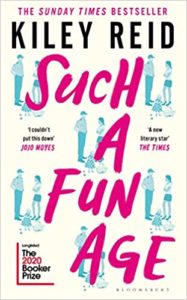 Such a good question – there’s loads I could name! The first one is Kiley Reid’s Such a Fun Age from 2020. I read it because my PhD student Charlotte Ireland is working on it for her PhD on chick lit, looking specifically at contemporary chick lit that’s post 2010 and how newer examples relate to or reuse tropes of the 1990s. Her really compelling argument is that this text we wouldn’t necessarily class as chick lit is ‘new’ chick lit: it’s a contemporary genre that’s doing something new and interesting with older tropes and bringing that together with contemporary feminism. I thought Such a Fun Age was brilliant in the way it reflects contemporary social themes, but also how contemporary popular literature relates to older examples, and how genre fiction is constantly changing. It’s the ephemerality of genre fiction that is really evident in this text.
Such a good question – there’s loads I could name! The first one is Kiley Reid’s Such a Fun Age from 2020. I read it because my PhD student Charlotte Ireland is working on it for her PhD on chick lit, looking specifically at contemporary chick lit that’s post 2010 and how newer examples relate to or reuse tropes of the 1990s. Her really compelling argument is that this text we wouldn’t necessarily class as chick lit is ‘new’ chick lit: it’s a contemporary genre that’s doing something new and interesting with older tropes and bringing that together with contemporary feminism. I thought Such a Fun Age was brilliant in the way it reflects contemporary social themes, but also how contemporary popular literature relates to older examples, and how genre fiction is constantly changing. It’s the ephemerality of genre fiction that is really evident in this text.
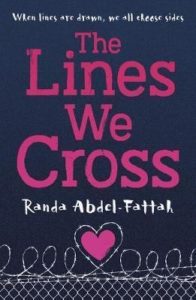 Then there’s a YA novel by Australian Randa Abdel-Fattah called The Lines We Cross from 2017. I read it as part of my project about romance, migration, and refugees. It’s the story of a romance between Mina, an Afghani refugee who is living in Australia, and Michael, whose father is the leader of an anti-immigration political group. It’s a depiction of a Romeo and Juliet kind of relationship that does a really good job of blending together those scenes of romance and identity seeking with very contemporary political ideas about anti-immigration discourse and Islamophobia in Australia. I’ve been reading a lots of popular fiction texts with themes of migration, but it was this text that really cemented to me that there is something going in contemporary genre fiction around this theme. It’s clear that this is a topic with which genre texts are engaging and have something interesting to say.
Then there’s a YA novel by Australian Randa Abdel-Fattah called The Lines We Cross from 2017. I read it as part of my project about romance, migration, and refugees. It’s the story of a romance between Mina, an Afghani refugee who is living in Australia, and Michael, whose father is the leader of an anti-immigration political group. It’s a depiction of a Romeo and Juliet kind of relationship that does a really good job of blending together those scenes of romance and identity seeking with very contemporary political ideas about anti-immigration discourse and Islamophobia in Australia. I’ve been reading a lots of popular fiction texts with themes of migration, but it was this text that really cemented to me that there is something going in contemporary genre fiction around this theme. It’s clear that this is a topic with which genre texts are engaging and have something interesting to say.
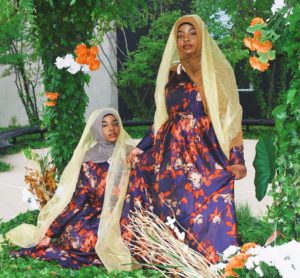
The last one I picked isn’t a text actually, it’s an album by a hip hop rap duo called Aint Afraid who are Muslim twin sisters who released their debut album in March 2021. Part of my research interest is in Muslim women’s popular fiction – so works created by Muslim women. I teach a third year module on which we look at a whole range of different texts – films, TV shows, stand up comedy and music – created by Muslim women. Aint Afraid were on the Spotify playlist for the module; I think it’s great music, but it’s also good at demonstrating that literature doesn’t exist in a vacuum. I think in the contemporary era, more so than other areas, literature blurs into other types of expression and creative work and creative practice and has a life beyond the printed text. It’s something we talked about on the module –the digital world and digital modes of expression – and I think that this album is a good example of Muslim women’s creative work and expression, and also the way that that we can think of contemporary literature much more broadly.
If you could only recommend 1 academic text to a novice in your field, what would it be?
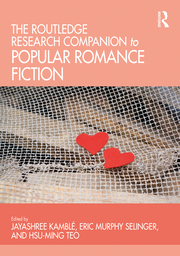 I interpreted this as a critical text. There’s a new text that was published in 2020, The Routledge Research Companion to Popular Romance Fiction, and it’s the first massively comprehensive textbook on the field of popular romance scholarship. It outlines everything you would ever need to know if you wanted to find out about popular romance research – what’s going on, both in terms of method and approach, themes, research on different types of romances. There is an eBook copy of it in the University of Birmingham library (it is quite expensive!) but I’d say it’s a one-stop shop book for everything you would want to know about popular romance scholarship.
I interpreted this as a critical text. There’s a new text that was published in 2020, The Routledge Research Companion to Popular Romance Fiction, and it’s the first massively comprehensive textbook on the field of popular romance scholarship. It outlines everything you would ever need to know if you wanted to find out about popular romance research – what’s going on, both in terms of method and approach, themes, research on different types of romances. There is an eBook copy of it in the University of Birmingham library (it is quite expensive!) but I’d say it’s a one-stop shop book for everything you would want to know about popular romance scholarship.
Do you have anything exciting coming up?
One thing I’m particularly excited about is that I was lucky enough to secure funding from the AHRC for a research network on Muslim women’s popular fiction. Over the next couple of years, I will be working with partners from Hong Kong, Pakistan, the USA, and Turkey on online workshops and in-person events exploring aspects of education, translation, decoloniality, visual culture, and mobilities relating to Muslim women’s popular fiction. There’ll be lots of kind of events and opportunities to get involved coming up so watch this space and check out the network website: https://blog.bham.ac.uk/mwpf-network
